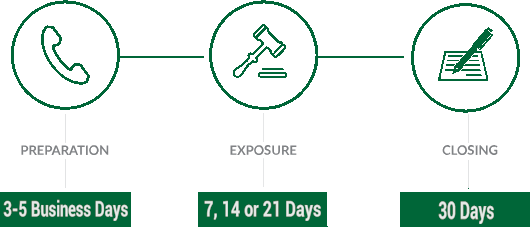- Home
- FAQ
FAQ
PROPERTY AUCTIONS 101:
AGENTS/SELLERS/BUYERS
How do I know if an auction is right for me or my client?
How does an auction benefit me?

Our buyers gain first access to our curated selection of the finest properties available from across the globe. They name the price via a straightforward and transparent bidding process, with a smooth, simple transaction.

Our sellers name the timing and terms of the sale with a transaction generated within a maximum of 90 days, as well as gaining global exposure with targeted marketing, PR and sales campaign, and access to an industry-leading database.

Our agent partners benefit from the activation of qualified bidders, access to award-winning marketing, and sales support with protected commissions.
Are auctions only for distressed properties or for all properties?
Why should I choose to auction instead of sell traditionally?
The iSoldOnline Process
Are agents protected?
What are the different auction formats you use?
- Without Reserve — The property will sell to the highest bidder on auction day. There is no minimum bid that must be exceeded to purchase the property.
- Reserve — The property will sell at or above a pre-determined price threshold on auction day.
This is a crucially important distinction. In a Public Auction a property may become polluted when low bids are displayed.
In a Silent Auction no other prospective buyer knows what the bidding prices are, so fear of possible loss potentially inspires higher bidding prices.
How does the auction process work?

What are the costs?
Do you accept pre-auction offers?
What is a Buy Now price?
Where does the auction take place?
- Typically Bidders are able to participate on site, online, via proxy or by phone.
- Portfolio Sale — The property will be auctioned “live”, alongside other properties, in a similar execution to that of an auction.
- Online Marketplace — Our online marketplace (iSoldOnline.co.za ) allows buyers to participate in our auctions digitally real-time from anywhere in the world. Bidders are able to watch bids live, and/or in conjunction with a phone or proxy representative when they are logged in. Bidding may take place solely on the website, or in conjunction with an or Portfolio Sale. Visit the property’s page online for details and to sign up for an account or log in.
ARE YOU READY
I am ready to sell my property at auction. What now?
Are You ready to register to bid. What now?
You may register to bid directly on the property page by clicking the “Register to Bid” button. Or, SMS +27 83 297 2963 us at for personal service. Our registration process has three steps:
- Complete and submit the Terms & Conditions of Sale.
- EFT your Bidder Deposit, typically R10,000 , which is credited towards your purchase if you are the winning bidder, or is returned the following business day if you are not.
- Provide a letter of reference from your bank or financial institution (sample included with the Terms & Conditions).
What are the costs?
Do you accept pre-auction offers?
What is a Buy Now price?
Where does the auction take place?
- Typically Bidders are able to participate on site, online, via proxy or by phone.
- Portfolio Sale — The property will be auctioned “live”, alongside other properties, in a similar execution to that of an auction.
- Online Marketplace — Our online marketplace (iSoldonline.co.za ) allows buyers to participate in our auctions digitally real-time from anywhere in the world. Bidders are able to watch bids live, and/or in conjunction with a phone or proxy representative when they are logged in. Bidding may take place solely on the website, or in conjunction with an or Portfolio Sale. Visit the property’s page online for details and to sign up for an account or log in.
ARE YOU READY
I am ready to sell my property at auction. What now?
Are You ready to register to bid. What now?
You may register to bid directly on the property page by clicking the “Register to Bid” button. Or, SMS +1 778 222 us at for personal service. Our registration process has three steps:
- Complete and submit the Terms & Conditions of Sale.
- EFT your Bidder Deposit, typically R10,000 , which is credited towards your purchase if you are the winning bidder, or is returned the following business day if you are not.
- Provide a letter of reference from your bank or financial institution (sample included with the Terms & Conditions).
I am text block. Click edit button to change this text. Lorem ipsum dolor sit amet, consectetur adipiscing elit. Ut elit tellus, luctus nec ullamcorper mattis, pulvinar dapibus leo.
iSoldOnline Silent Auction
Does it deliver sellers the best possible results?
As a seller determined to achieve the highest possible price in the current market, the one thing that you should never do is let your interested buyers know what other offers you have received. When buyers competing offers are disclosed to one another at an auction, they do not focus on putting their best foot forward by offering the highest price they are respectively willing, able and prepared to pay.
The buyers focus on beating the competition and winning the auction rather than paying their maximum price. With iSoldOnline submitted bids are confidential, thereby enticing seriousloy interested Buyers to bid higher rather than lower.
Do you want to know the highest price every buyer is prepared to pay for your property?
When you assemble all your interested buyers at one venue and shout at them with a pointed hammer (as happens at a public auction), you invariably end up with a series of $500 or $1,000 bids to close out the sale.
But what happens if the final bidder was prepared to pay $50,000 more than the second highest bidder? In that case, as often happens at public auctions, the seller loses $49,000 they could have had, if they hadn’t sold through a public auction.
Virtually every seller sell their properties for less than the buyer was prepared to pay for it. It amounts to silent pain for the seller and silent gain for the buyer. iSoldOnline never allows this to happen. Only the Seller and the Preferred Agent know what the submitted bids were.
Competition
Negotiation experts (and card players) all agree that you should never let the other side know what your position is. During a hand of poker, have you ever seen a card player turn their cards up for everyone at the table to witness and ask the competitors for advice? As a property seller, why let the buyers see your cards? Agents often talk homeowners into public auction as the best way to ‘create competition’. What is often overlooked is that buyers are competing for the property and are not bothered by the process used to sell the property. Interested buyers will compete for the home, regardless of which sale process is used.
Bidding at a public auction is not competitive – it is comparative. . If a bid of $1,000,000 is made at an auction, the next bid will likely be R1,005,000, or R1,010,000. It won’t be $1,200,000 or $1,300,000. Each buyer attentively listens to each competitor’s bid so that they can bid at comparative levels and not competitive levels.
Many buyers who are the under bidder at an auction make an off hand comment that they stopped bidding because the other party was just going to keep going.
This regularly happens at public auctions but would never happen using the iSoldOnline Silent Auction Tool.
Campaign
Public auction campaigns focus mainly on maximising the number of interested buyers and setting a deadline for those buyers to act, regardless of the sale process chosen by the seller. Some agents say that by having a public deadline, it pressures buyers into action. That may be true in some cases, but it also puts pressure on sellers to ‘meet the market’. If not, they risk passing their property in at auction and having the final bid recorded in the Sunday paper as the AUHB (Auction Highest Bid). Now all the buyers and all the agents know what the highest bid was. This is disastrous in terms of the property value proposition and definitely won’t help the seller to achieve the highest possible price, even at a later stage.
That definitely won’t help the seller achieve top dollar later. Having a publicly known deadline creates just as much pressure for the seller as it does for the buyer. This scenario is orchestrated by agents to ensure that a sale is made. At a public auction, getting a sale on the day in front of the crowd is usually the aucioneers main priority.
Silence is golden
In Scotland, when agents are ready to close out a real estate transaction, all the interested buyers submit their best, highest and final offer in a sealed envelope for the seller’s consideration. Some call this a ‘silent auction’. In most, if not all cases, the owner sells the property to the party with the highest offer. Scottish people do enjoy a quid. The Scottish know that if you let a $1 million dollar buyer know that the next best offer you have received is only R900,000, you will only be offered R901,000 from the buyer that was prepared to pay R1 million. How could the seller justify asking for that extra R90,000?
One real estate firm which regularly conducts silent auctions in Australia explains how the sale of a prestige family home in Balmain, New South Wales, achieved the highest possible price using a silent auction. Not only did it achieve the highest possible price, it achieved a price that would have been mathematically impossible using a public auction where bidding is open.
‘The property generated enormous interest in a short period of time. Given there was sufficient interest in the home, a deadline was set to ensure closure whilst the interest was high.
The homeowner set their private reserve price at $2 million.
‘All four interested buyers submitted their best, highest and final offer on or prior to the nominated deadline. Each offer was submitted on a binding contract with deposit cheque. The offers came in at R1,950,000, R2,050,000, R2,150,000 and R2,210,000 respectively.
The contracts were exchanged for R2,210,000 providing the owners with a R55,000 windfall that a public auction would have failed to achieve.
A public auction would have sold the home for R2,155,000, which would have been an outstanding result for the owners. Although R2,155,000 would have delighted the seller, by conducting a silent auction, they achieved the highest price the highest bidder was prepared to pay.
If the property did sell at public auction, many people would have understandably left the auction mightily impressed. The newspapers would have reported how the property sold for a whopping R155,000 above the reserve price. The R55,000 left in the buyer’s pocket would be a silent victory for them when it would have appeared to everyone that the owners had a public victory.







